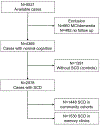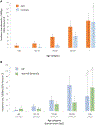Subjective cognitive decline and rates of incident Alzheimer's disease and non-Alzheimer's disease dementia
- PMID: 30555032
- PMCID: PMC6465066
- DOI: 10.1016/j.jalz.2018.10.003
Subjective cognitive decline and rates of incident Alzheimer's disease and non-Alzheimer's disease dementia
Abstract
Introduction: In this multicenter study on subjective cognitive decline (SCD) in community-based and memory clinic settings, we assessed the (1) incidence of Alzheimer's disease (AD) and non-AD dementia and (2) determinants of progression to dementia.
Methods: Eleven cohorts provided 2978 participants with SCD and 1391 controls. We estimated dementia incidence and identified risk factors using Cox proportional hazards models.
Results: In SCD, incidence of dementia was 17.7 (95% Poisson confidence interval 15.2-20.3)/1000 person-years (AD: 11.5 [9.6-13.7], non-AD: 6.1 [4.7-7.7]), compared with 14.2 (11.3-17.6) in controls (AD: 10.1 [7.7-13.0], non-AD: 4.1 [2.6-6.0]). The risk of dementia was strongly increased in SCD in a memory clinic setting but less so in a community-based setting. In addition, higher age (hazard ratio 1.1 [95% confidence interval 1.1-1.1]), lower Mini-Mental State Examination (0.7 [0.66-0.8]), and apolipoprotein E ε4 (1.8 [1.3-2.5]) increased the risk of dementia.
Discussion: SCD can precede both AD and non-AD dementia. Despite their younger age, individuals with SCD in a memory clinic setting have a higher risk of dementia than those in community-based cohorts.
Keywords: Alzheimer's disease; Dementia Lewy bodies; Dementia incidence; Frontotemporal dementia; Preclinical Alzheimer's disease; Subjective cognitive decline; Vascular dementia.
Copyright © 2018 The Authors. Published by Elsevier Inc. All rights reserved.
Figures




References
-
- Schmand B, Jonker G, Hooijer C, Lindeboom J. Subjective memory complaints may announce dementia. Neurology 1996;46:121–5. - PubMed
-
- Geerlings MI, Jonker C, Bouter LM, Ader HJ, Schmand B. Association between memory complaints and incident Alzheimer’s disease in elderly people with normal baseline cognition. Am J Psychiatry 1999;156:531–7. - PubMed
Publication types
MeSH terms
Grants and funding
LinkOut - more resources
Full Text Sources
Medical

